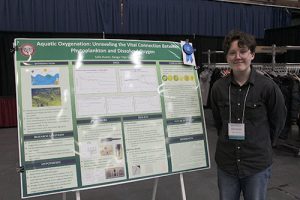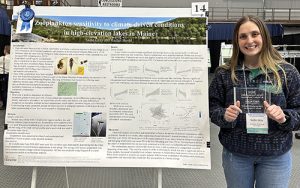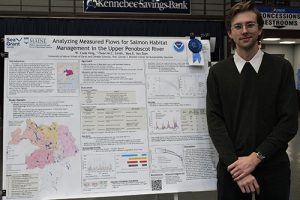Poster Session Winning Students – 2024 Maine Sustainability & Water Conference
The 2024 Maine Sustainability & Water Conference featured presentations on numerous research projects related to sustainability and water resource issues in Maine. The event’s poster session featured 44 posters, 36 of them led by students. Several students received awards and recognition for their posters which were judged on the definition of the research problem, use and description of methods, description and interpretation of results, and clarity of expression and visual organization. Here is a short overview of the award winners and their research.

The high school award went to Sofie Rueter of Bangor High School and her poster: Aquatic Oxygenation: Unraveling the Vital Connection Between Phytoplankton and Dissolved Oxygen. Microorganism populations, like phytoplankton, supply most of Earth’s oxygen throughout marine ecosystems; if a population expands to an unstable level, it could become toxic to the environment. Sofie determined that the circulation of oxygen throughout water reinforces the stability of marine phytoplankton populations. An honorable mention went to McKenzie Vorenkamp, also of Bangor High School, and her poster: Analyzing the Correlation of Human Activity to Microplastic Concentration along the Arctic Brook Stream using Arc-GIS and Image Analysis.

The undergraduate award went to Sadie Gray of the University of Maine Farmington and her poster: Zooplankton Sensitivity to Climate-Driven Conditions in High-Elevation Lakes in Maine. Lake ecosystems respond to climate change in various ways, knowing how these environments respond could help scientists anticipate further changes. Sadie analyzed nine high-elevation lakes throughout Maine to determine the conditions that most impact zooplankton populations, such as dissolved oxygen. She hopes this research will be useful as climate change shifts lake conditions. An honorable mention went to Samantha Summerfield of St. Joseph’s College and her poster: The Carbon Cycle in Hydroponic Farming.

The graduate award went to Cade King of the University of Maine and his poster: Analyzing Measured Flows for Salmon Habitat Management in the Upper Penobscot River. Civil infrastructure can both positively and negatively impact water ecosystems like the Penobscot River’s East Branch by altering their flow. Cade determined that century-old architecture, such as dams and canals, continues to impact the natural flow of the Penobscot’s East Branch; future river restoration projects need to consider the old architecture, habitat damage, societal needs, and climate change to best protect the river ecosystems. An honorable mention went to Paulina Alulema-Pullupaxi of the University of Maine for her poster: Physicochemical Factors Influencing Release of Per- and Polyfluoroalkyl Substances from Spent Granular Activated Carbon in Landfill Environments.
Congratulations to those who received an award and all the students who participated. Their accomplishments represent a significant milestone in their academic careers, and include important additions to scientific understanding of their areas of study. To see abstracts for all the presented posters, click here.
